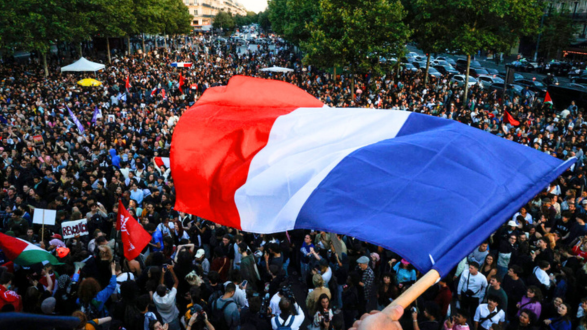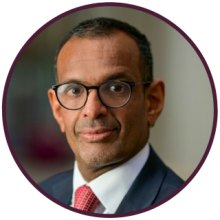Zoom Webinar
Following the European Parliament elections, which saw the rise of France’s far-right National Rally party (RN), French President Macron surprised allies and political analysts alike by calling for a snap election. Following the first round of votes, Marine Le Pen’s RN seemed to be on track to hold the most seats of any party or coalition. However, the second round of elections revealed the prominence of the recently formed New Popular Front (NFP) coalition, which consists of parties from the far-left to the center-left. Macron’s own coalition, the Ensemble alliance, composed of moderate political parties, now holds the second most seats, marking an expected blow to Macron’s power. The National Rally holds the third most seats of any group but maintains the most of any single party. Although not the victory Le Pen and her hand-selected party leader, 28-year-old Jordan Bardella, anticipated, the far-right politics of the RN have surged in popularity in France.
Despite Macron’s desire to clear up the state of French politics, it seems that more questions have been created than answered. The NFP, despite the electoral success of the bloc, is far from unified, leaving unclear how they will move forward. There is great disagreement and strife between the two most popular parties within the NFP, the far-left France Unbowed and the center-left Place Publique. This leaves uncertainty about France’s next prime minister, as the French president typically appoints the PM from the largest group in parliament. The question of Prime Minister is further complicated by President Macron’s refusal to accept the resignation of the current prime minister, Gabriel Attal. The NFP vowed to significantly increase spending, which may conflict with the EU’s fiscal rules and certainly will increase France’s deficit which has already been snowballing. France's government and future remain uncertain with a burgeoning far-right party, the erosion of President Macron’s centrist bloc, and the rise of a newly formed left-wing coalition.
Our distinguished speakers will discuss the results and the implications this election will have for France, the United States, and the rest of the world. Guests will also have the opportunity to participate in a Q&A session.
To register for the France election webinar, visit Zoom Registration Page.
Guest Speaker
Dr. Mabel Berezin is a comparative sociologist whose work explores the intersection of political institutions and cultural meanings with an emphasis on challenges to democratic cohesion and solidarity in Europe and the United States. She is the author of Making the Fascist Self: The Political Culture of Interwar Italy, which was awarded the J. David Greenstone Prize by the American Political Science Association and which Choice named an “Outstanding Academic Book of 1997; lliberal Politics in Neoliberal Times: Culture, Society and Populism in the New Europe; and co-editor with Martin Schain of Europe without Borders: Remapping Territory, Citizenship, and Identity in a Transnational Age.
Berezin’s research lies at the intersection of cultural and political sociology. In addition to numerous articles, review essays and contributions to edited volumes, she has edited four collaborative volumes: Democratic Culture: Ethnos and Demos in Global Perspective (with Jeffrey Alexander); an issue of Theory and Society (38 (4) 2009), entitled “Emotion and Rationality in Economic Life;” and an issue of Qualitative Sociology (37 (2) 2014), entitled Methods, Materials and Meanings: Designing Cultural Analysis.” She has Guest Edited with Michele Lamont, Alonzo Plough and Matthew Trujillo a Special Issue of Social, Science and Medicine (165 (September) 2016) on “Mutuality, Health Promotion and Collective Cultural Change.”
She has held fellowships from the European University Institute, the Leverhulme Trust, ASA Fund for Advancement of the Discipline and the German Marshall Fund. She is working on a monograph When Security Ends: the Crisis and Challenges to Democracy in Europe and Beyond that addresses the global resurgence of nationalism and the populist challenge to democratic practice.
Guest Speaker
David Andrews is a Professor of International Relations at Scripps College, where he is also the Gabrielle Marie-Louise Jungels-Winkler Chair in Contemporary European Studies and the founding director of the European Union Center of California.
Dr Andrews’ scholarly research has addressed Atlantic political, security, and economic relations; the European Union and European integration; and international relations, diplomacy, and statecraft. His books include The Atlantic Alliance Under Stress: US-European Relations After Iraq (Cambridge University Press), Orderly Change: International Monetary Relations Since Bretton Woods (Cornell University Press), and International Monetary Power (also with Cornell). He has been a visiting scholar at the University of Southern California, the London School of Economics, and the European University Institute in Florence, Italy, where he was a Senior Research Fellow in Transatlantic Affairs. In 2009, he was named a Jean Monnet Professor of European Union Interdisciplinary Studies by the European Commission.
Dr. Andrews holds a B.A. in American Studies from the University of California, an M.A. in International Relations from Brigham Young University, and a Ph.D. in Political Science from the Massachusetts Institute of Technology.
Moderator
Anand Menon is Professor of European Politics and Foreign Affairs at King's College London. He also directs the UK in a Changing Europe project (www.ukandeu.ac.uk). His areas of research interest include the policies and institutions of the European Union, European security, and British politics. He contributes regularly to both print and broadcast media. He is co-editor of the Oxford Handbook of the European Union (OUP, 2012), and co-author of Brexit and British Politics (Polity 2018). He is a trustee of Full Fact, a member of the Strategic Council of the European Policy Centre, a Council member of the European Council on Foreign Relations and an associate fellow of Chatham House.
---
The Pacific Council's 2024 Global Election Series
This summer the Pacific Council will host a series of webinars looking at the results from four major elections, Mexico, India, the United Kingdom, and France. The conversations will examine what the results mean for each country, their allies and provide time for Pacific Council members to engage in Q&A with expert speakers.
Each election has the potential to shift the respective bilateral relationships with the U.S. In Mexico, a range of critical issues will need to be addressed with U.S. partners including: trade, migration and illegal trafficking.
The election in India will be watched closely due to India’s importance as an ally for countering China’s regional influence and prominent role in global trade. Additionally, at a time when democratic institutions and elections are under threat from foreign interference and disinformation, all while populist rhetoric continues to escalate, a successful election in the world’s largest democracy can be a positive moment for the democratic community.
Finally, in the United Kingdom, where the post-Brexit landscape continues to take shape, the election will be crucial for ensuring the continuation of the unique bilateral relationship between the U.K. and U.S. on issues related to transatlantic trade, global financial markets, NATO in the face of Russian aggression, and intelligence cooperation.







